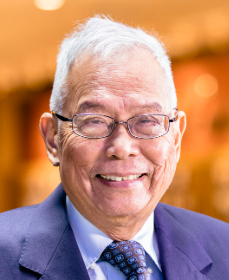
Wealth is a good servant, but need not be our master, says retired professor of economics, Dr Lee Soo Ann. Photo by Anastasiia Ostapovych on Unsplash
When a man asked Jesus what good he had to do to have eternal life, Jesus asked him whether he had obeyed the commandments. When he asked which, Jesus recited a few representative ones. The man replied he had kept (all) the commandments (Matthew 19:20).
Jesus then told him that if he wished to be perfect, he needed to sell all and give to the poor. Scripture records that he turned away sorrowful. It is recorded that this man had great possessions.
Wealth is a good servant but Jesus saw into the heart of his questioner, that wealth had become this man’s master.
There was one commandment he did not obey and that was the first commandment of having no other gods besides God. In telling the man to sell all his possessions, Jesus was reminding him of the first commandment: “I am the Lord your God, who brought you out of the land of Egypt, out of the house of slavery. You shall have no other gods before me.”
His possessions were his god. Yet there is no explicit commandment that one must not accumulate possessions or wealth. Wealth was in existence at the time that Abraham purchased a burying place for his wife Sarah (Genesis 23:8-9).
Wealth is a good servant but Jesus saw into the heart of his questioner, that wealth had become this man’s master, in other words, his god.
The question facing Christians today is whether wealth is a servant or a master. It can become a master but it can also be treated as just a servant.
Above all else – or not
Why is it so difficult to put God first when it comes to wealth or money or possessions?
Much of the answer lies in the nature of economic activity today. When a child is asked “where does food come from?”, back would come the answer: “The refrigerator!” Obvious though this is, many adults tend to adopt this erroneous line of thinking. The Christian answer is that “food comes from God”.
God is in money but money is not God.
However, the roundabout nature of production tempts us to forget God. There is a long supply chain, starting with the growing of crops and animal husbandry in farms. Then comes their processing and transportation to the post and across oceans. Last but not least is the shop where the food is retailed, and the home refrigerator in which the food is stored until required.
In this long supply chain, money is used. We need to reflect on how money is a social invention. Through the use of money we can know the price of everything though its intrinsic value is actually nothing. We next need to reflect how the process of buying and selling through the use of money enables production to expand. Money did this in speeding up a growth in objective thinking, money itself being an object, such objective thinking being behind the growth in output of goods and services.
Production expands through enterprises making of profits using money. This process is shown to result in unnecessary product differentiation, such that there is poverty in the midst of abundance. Production is also expanded through the use of technology paid for by the profits made. Last but not least, production is expanded through corporate life. Corporate life generates conflicts in values and can reduce our personal life with God.
The conclusion is that God is in money but money is not God.
Calling out the fakes
The many gifts God gives to us (the use of money, the incentivisation through money or profits being made in product differentiation, the use of technology made possible through money and the corporatisation of economic activity also largely through money) need to be counter-balanced through gratitude and praise to God if they are not to become the gods of our age.
Human pride and greed change aspects of the supply chain into false gods.
Bob Goudzwaard in his book Idols Of Our Time identifies several technologies as idols, namely, “the ideology of revolution”, “the ideology of nation”, “the ideology of material prosperity” and “the ideology of guaranteed security”. In much the same way many aspects of economic life today can become our idols. The poor today may see money as providing the little food they have and so may worship money.
It may however, be easier for them not to worship money since they have very little and are open to God speaking to them. Those who are rich in contrast may see money as behind everything they have and do not put God first at all.
Jesus went on to say that “only with difficulty will a rich person enter the kingdom of heaven”. When his disciples reacted with astonishment, Jesus answered “with man this is impossible, but with God all things are possible”.
With an appreciation of who God is, money and wealth need not be a god. It is God who gives, and man should regard the long supply chain as a gift. Without God, man will tend to view this chain as what he and mankind himself generated. Human pride and greed change aspects of the supply chain into false gods.
Recognising the True Giver of all things
In the past and in many agriculture-based societies today, there is the acknowledgement that it is the fertile land, the sunshine and the rain which enable food to be grown or cultivated. People thus erroneously attributed abundant crops to the sun or climate or soil and made gods out of them. The pages of the Bible tell us of these objects being worshipped, rather than the one true God.
The rich man can be saved, so also the poor, as all of us tend to be seduced by the power of money.
Today God is hidden by the human pride and greed which can arise from the long supply chain of today. Even though the chain is long, God is there:
- in the use of money for crops to be handled,
- in the accumulation of money as an asset
- the investment of money in the form of the technology used in processing and transport
- the incentivisation provided by money in product differentiation
- the use of technology used in production, transport and distribution and
- the corporatisation of money in the many enterprises which enable food to be finally found in our refrigerator.
We need to see how God is behind the use of money in these various ways so that it is God who ought to be praised.
We need to reflect on how man subverts the gifts of God by not placing limits on the use and the expansion of these gifts. The rich man can be saved, so also the poor, as all of us tend to be seduced by the power of money.
Imago Dei
Man has invented money in its various expressions, but it is God who creates the food, clothing and shelter which we enjoy. God also created the human being in a human body.
The human body is made up of cells, the building blocks of life, more than 10 trillion of them being in a human body. There are more cells in the human body than there are galaxies!
Without knowing God, man may lapse into seeing his exercise of stewardship as if it were an act of creation.
Psalm 139 truly states that “I praise you, for I am fearfully and wonderfully made” (Psalm 139:14). Yet the human being is more than a human body. God breathed into the body and gave His life into it. “Then the Lord God formed the man of dust from the ground and breathed into his nostrils the breath of life, and the man became a living creature” (Genesis 2:7).
This verse comes before Genesis 2:15 which emphasises the responsibility of man towards the created order. When God breathed into Adam his life, it means that Adam is the image of God, which is what the first account of creation states, in Genesis 1:27 “in the image of God (God) created him”.
The fact that we are made in the image of God means that we can relate to, and be accountable to, God. It is to God then that we must turn to discover how we can be proper stewards of God’s created order. Man needs first to know who God is, in order to properly exercise dominion over the fish of the sea and over the birds of the heavens and over every living thing that moves on this earth.
Without knowing God, man may lapse into seeing his exercise of stewardship as if it were an act of creation, and so he credits to himself the growing and harvesting of crops, their transport and sale in urban centres and so on.
Man ends up in the mistaken belief that food comes from the refrigerator.
Without a consciousness of God, we tend to carry out our responsibility as workers, managers, savers and investors accountable only to other human beings. We are indeed accountable to other persons, but more important is our primary accountability to God as the Creator and preserver of the created order. Secondary is our accountability to other persons.
This is an excerpt republished with permission from Dr Lee Soo Ann’s God And Money, Reflections On Economic Issues by Ethos Institute For Public Christianity as part of their Engagement Series. The book can be purchased online or at the bookshop located at Bible House Singapore.
We are an independent, non-profit organisation that relies on the generosity of our readers, such as yourself, to continue serving the kingdom. Every dollar donated goes directly back into our editorial coverage.
Would you consider partnering with us in our kingdom work by supporting us financially, either as a one-off donation, or a recurring pledge?
Support Salt&Light



